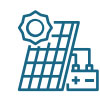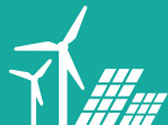
A Community of Practice (CoP) is a network of engaged experts and practitioners from a sector or working area who come together as a group to regularly engage in peer -to- peer learning to improve their personal and collective group knowledge. The network offers an alternative to conventional knowledge sharing platforms that usually feature top-down development assistance and policy adoption by providing an inclusive member experience. The activities of each CoP focus on peer learning, expert assistance and knowledge exchange through discussions, workshops, seminars, case studies etc. in topics found to be of relevance to the members. There are five CoPs under the Asia LEDS Partnership (ALP).
The Grid-scale Renewable Energy (GRE) CoP brings together national and subnational governments, regulators, system operators, technical institutions, businesses, non-profits, and international organizations to discuss the policy, financing, technical challenges and solutions related to grid integration, competitive procurement and zoning of renewable energy projects across the Asia region.

DERs are resources connected to the distribution system close to the electricity load. DERs include distributed photovoltaic solar, wind, combined heat and power, microgrids, microturbines, storage technologies, and others. DERs have the potential to provide services to customers, distribution grids, and the electric system, but DER growth may present challenges. This CoP aims to address some of these challenges.

Resilience in power sector is critical to ensure continuous supply of power to essential services at the time of disasters such as COVID-19 and climatic disasters. Bringing resilience to power sector is a complex subject and has to be done in a systematic manner over time. There are a variety of resilience solutions such as spatial and general diversification, microgrids, supply chain assurance, energy storage, and so on. The CoP offers solutions and fosters capacity building in Resilient Energy Systems.

As part of the new support activity launched under the GRE CoP, countries would be supported on the development of more ambitious, longer-term visions for power sector transformation. The development of long-term plans will support countries in considering the longer-term implications of economic recovery and stimulus programs and, where desired, visions can be fully integrated with recovery efforts.


The session was convened on 4th of September 2019 by the LEDS Global Partnership and its regional platform ALP. The session aimed to give the GRE CoP members an understanding of the linkages between clean mobility and large-scale integration of renewable energy and provided a space to engage in deeper discussions on their particular priorities, challenges and opportunities in clean mobility and utility-scale as well as distributed RE scale up

This peer learning session organized by the Asia LEDS Partnership’s GRE Community of Practice explored emerging practices to improve power system flexibility, with a particular focus on applications and value streams from utility-scale battery storage, and’. The session provided a space for the members to engage in deeper discussions on their particular priorities, challenges and opportunities for system flexibility and utility-scale battery storage

The ALP, National Renewable Energy Laboratory (NREL), and USAID conducted an in-person session on June 6 at the Asia Clean Energy Forum(ACEF) 2018 in Manila, Philippines as part of the ALP"s Grid-Scale Renewable Energy Community of Practice(GRE CoP). The peer-learning session built on key concepts and findings from a deep-dive workshop organized at the by USAID, GIZ and NREL on June 5, 2018 on ‘Grid Integration of Variable Renewable Energy’. The GRE CoP session provided a platform to engage in deeper discussions on key priorities and challenges of renewable energy grid-integration in the participating countries. Participants included government utilities representatives, power system regulators, and representatives from technical institutions from Bangladesh, Bhutan, India, Indonesia, Kazakhstan, Laos PDR, Nepal, Sri Lanka, and Thailand.

The ALP through its GRE Community of Practice with the support from the NREL, provided technical assistance to Nepal Electricity Regulatory Commission (ERC), in form of a series of online training workshops/webinar. The technical assistance aimed to build expertise among ERC commissioners and staff on integrated resource planning (IRP) best practices and thus enable effective engagement with Nepal Electricity Authority (NEA), Water and Energy Commission Secretariat (WECS), and others on least-cost resource planning as well as identify economic recovery indicators related to planning

The ALP through its GRE CoP, with support of the Climate Helpdesk and NREL provided technical assistance to Mongolia’s Electricity Regulatory Commission to identify possible technological alternatives for space heating in residential buildings in Mongolia’s capital city of Ulaanbaatar. The technological alternatives identified through the technical assistance can help reduce residential buildings reliance on conventional heating systems, and thereby support the country in meeting its NDC goals.
The case study discusses how the Ceylon Electricity Board (CEB) approached the study on grid integration process for renewable energy in Sri Lanka and the key learnings therein. Sri Lanka in its INDC has committed to reduce twenty-per cent of its GHG emission by 2030. In accordance with this target, Sri Lanka adopted a policy for the long-term development of Renewable Energy (RE) in the country
As the RE generation in Sri Lanka is variable and dispersed, the increased deployment of renewable energy-based generation brings operational challenges in terms of power system stability and power security into the grid. The detailed study and analysis of integration process paved the way for overcoming the challenges and ensured a more reliable transition towards greener growth.
This case study has enabled the development of country’s RE sector and is now considered as the backbone of any decision-making process in Sri Lanka’s power sector. The lessons learnt from the study are compelling and applicable worldwide. Access the document here.


Webinars and online moderated discussions on the above topics
No-cost expert technical assistance and/or peer exchanges to support advancement of NDC/climate change goals
Sharing of existing resources on the above topics and access to the Clean Power Hub
Preparation of concise fact sheets or other supplementary resources for the CoP members where needed
Organize networking session between GRE CoP members and members of the Youth Sustainable Energy Hub to encourage greater collaboration
Clean Power Hub (CPH) is a new effort designed to accelerate the human and institutional capacity needed to transition clean energy goals. The Clean Power Hub provides free guides and support on clean power policymaking, regulation, system operations, project development and finance.
The ALP GRE CoP together with CPH platform will provide the CoP members with further guidance, learning opportunity, tools/resources, step by step guidance and best international expertise on clean power.
 Join the
Join theRepresentatives from national and sub-national government agencies, regulators, system operators, technical institutions, private firms, NGOs and/or international organizations working on renewable energy analysis, policies and deployment in the region are invited to be part of Grid Renewable Energy Community of Practice. Membership is voluntary, free of cost and unlimited in duration Sign-up form for the GRE CoP.
To know about other Communities of Practice, you can join as an ALP member (as an individual/organization) by completing a cost-free membership sign-up form.
C-3, Lower Ground Floor, Green Park Extension
New Delhi - 110016, India
+91-11-4106 7220 AsiaLEDSPartnership
alpsecretariat@iclei.org @AsiaLEDS | www.AsiaLEDS.org

